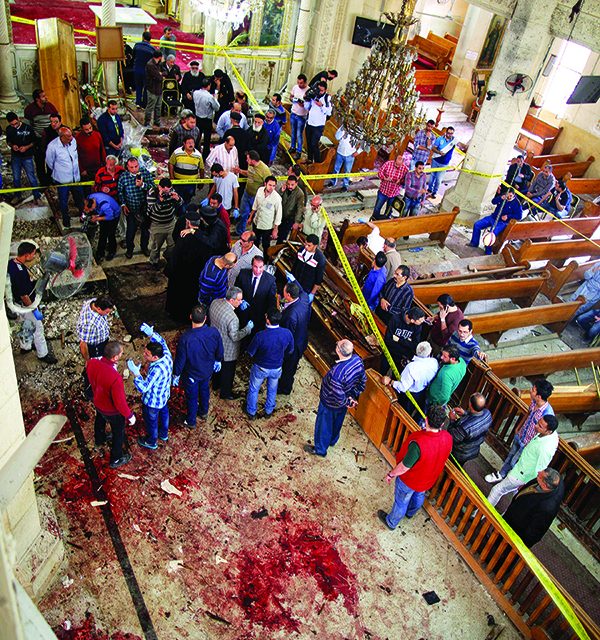On Easter Sunday, 2019, in Colombo, Sri Lanka, Michel Thass watched as his wife and 7-month-old daughter left for church. He wouldn’t be far behind. He and his wife had agreed their 5-year-old son should sleep in a bit longer. But when Michel finally arrived at the church, with his young son still nodding drowsily, he didn’t know what was waiting for him.
A bomb had detonated moments before he walked in the door. His wife, Riswani, a convert from Islam, lay on the floor covered by bodies caught in the blast. Michel frantically searched for their infant daughter, only to find her flung across the room, horrifically injured. Miraculously, baby Athara survived, although she’s had to undergo three surgeries. Riswani was also spared, but she suffers from deafness in one ear and the extreme shock of experiencing such a traumatic event.
The bomb was one of three that exploded at churches that day in Sri Lanka. The suicide bombers responsible for the blasts claimed the lives of more than 200 believers that Easter Sunday—a day most Christians revere as a celebration of resurrection, not violence and death. For most of us here in the United States, an expectation of violence is the furthest thing from our minds during the Easter season.

But that’s not a luxury afforded to many Christians around the world. From Palm Sunday to Easter Sunday, everyone knows believers are eager to worship together with their friends and their family. And so, many terrorists choose to attack during the holiest week of the year for Christians.
On Palm Sunday 2017, bombings in Egypt took the lives of 40 Christians, injuring 100 more. After the blasts erupted in the Coptic churches, many believers opted to stay home from church the following year for fear of another attack. “Of course we feel targeted,” one Christian woman said. “There was a bomb here about a week ago but it was dismantled. There’s no security.”
Some Christians will celebrate Christ’s resurrection this year unable to even attend a public service. In some places, their Easter service might look like a birthday party or a dinner party to disguise the true reason for a gathering. These brothers and sisters will have to keep their worship quiet, away from the prying eyes of neighbors and passersby. In places like Iran, Somalia or Afghanistan, anyone caught worshiping Jesus on Easter—or any other day of the year—can be imprisoned, attacked or even killed.
Yet these Christians still remember where their hope lies. One Egyptian field worker from Open Doors, who grieved with others after the bombings in his country, says: “We cast out a spirit of fear with the power of His love. We will go to churches and beyond to worship the Name of Jesus. We will spread out the light we were given by His grace, in every street, village, town and city. We will keep praying for all Egyptians, especially for those dark-minded, brainwashed and misled, so that our Father may cleanse their hearts and minds.”
Hope in the Savior for Whom You Are Persecuted
It’s the paradoxical reality of worshipping Jesus in places around the world where following Him makes you a target: The very love of Christ that causes you to be attacked is the same love that gives you the hope that Jesus will redeem everything. Christians around the globe will risk everything to follow Jesus this Easter, and they will do so with joy and hope in a risen Savior. And through our prayers, we can remind them they aren’t alone.
Praba is a Sunday school teacher at Zion Church, another congregation in Sri Lanka that was bombed on Easter Sunday in 2019. She lost her 8-year-old son, Peter, in the attack.
Her son’s death has taken its toll, but Praba knows the prayers of believers all over the world have had an impact. “After we lost Peter, for about six months I could not pray,” she says. “Whenever I sat down to pray, ‘Jesus’ was all I could manage to say. I could only cry. But people who had never even seen us were praying for us when we could not. It is because of their prayers that we have been able to stay strong in our faith. Thank you for upholding our family in prayer during this time.”
Her family has been devastated and changed forever, but Praba’s faith has grown—even as they grieve and question, their hope remains. “The day after we buried Peter, I sat at home crying, thinking about him. Did he feel any pain? What if he had called out for me, saying ‘Amma!’” she remembers.“I had many questions. But while I was crying, God showed me a vision, and in it, Jesus was holding Peter in his hands. That is where Peter is, and that is where I will go someday. That is my hope, and my hope is what keeps me going.” ©2022 David Curry
David Curry is CEO and president of Open Doors USA, a global ministry serving persecuted Christians in more than 60 countries. He has testified before Congress on religious freedom issues and is often quoted in a variety of publications on the issue of persecuted Christians.
Above: A bomb destroyed St. Sebastian’s Church in Negombo, Sri Lanka, on April 21, 2019.
Photo: UPI/Newscom
